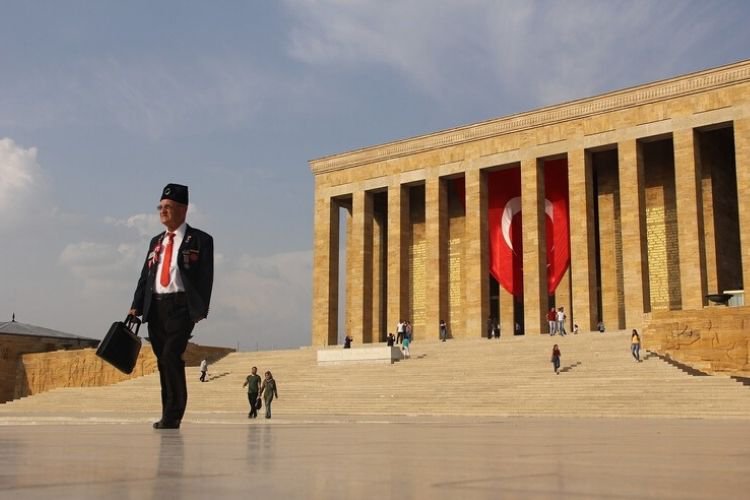Turkey in the Baltic-Black Sea region: its past and future
30.05.2020«Туреччина в Балто-Чорноморському регіоні: минуле й майбутнє»
Should we refer to the Baltic-Black Sea theme, we primarily consider the 1919 conference when Ukraine and the Baltic countries signed an agreement on the creation of the Baltic-Black Sea Alliance. In addition, we might refer to Pilsudski’s post-World War I Intermarium concept, Gedroits-Miroshevsky, the Belarussian project «New Commonwealth».

Should we refer to the Baltic-Black Sea theme, we primarily consider the 1919 conference when Ukraine and the Baltic countries signed an agreement on the creation of the Baltic-Black Sea Alliance. In addition, we might refer to Pilsudski’s post-World War I Intermarium concept, Gedroits-Miroshevsky, the Belarussian project «New Commonwealth». However, in this case, certain political and territorial imbalance is configured towards the Baltic states. At the same time, we can agree with Yuri Lipa and consider not only Ukraine but also other (except Russia) Black Sea countries, in particular Turkey as potential participants in the Baltic-Black Sea communications.
Over the last quarter of a century the Turkish Republic (referred to as the TR) has significantly increased its foreign policy activity. Its main vectors are traditionally directed to the Middle East, the Balkans, Central Asia and the Caucasus. The influence of official Ankara is evidently reflected on all the most important military-political and socio-economic processes happening within these regions. At the same time, Crimea as an important component of the Balkans-Caucasus arc in a short and minimum term will remain in the zone of increased attention not only of Ukraine but also of other states, including those countries that are a part of the North Atlantic Alliance and the European Union. An additional factor complicating the problem of Crimea and the Black Sea as a whole is the continuing Russian occupation of the peninsula. Military-economic and ethno-cultural potential of the Turkish Republic against the background of NATO integration and the Black Sea (Crimean Tatar issue, etc.) could have a serious impact on the future of the entire Baltic-Black Sea territory. Under described circumstances, it is of considerable interest to evaluate objectively the consequences of the implementation of the Ankara regional strategy.
From a historical perspective, it is advisable to divide the Turkish Republic foreign policy into three stages. The first would be from the early 1920s to the second half of the 1940s, the second would be from the mid-1940s to the late 1980s / early 1990s and the third would be from the early 1990s to the present.
The first stage could be conditionally designated as a period of «internal integration». The year of 1920 became a further point of bifurcation for the Turkish ethnic group. By this time, the High Port and its allies had been defeated in World War I. Istanbul relinquished control over most possessions in Europe, Africa and the Middle East. The capital and straits of the Bosporus and the Dardanelles (hereafter the straits) were occupied by the Entente powers. The creation of a zone in the south of modern Turkey (Izmir and surrounding areas) under the control of Greece was considered, in the east — the creation Armenia, in the southeast — the territory around Diyarbakir was planned to be transferred to the Kurdish state, which the allies of the Entente sought to create. In such an environment, solely the political genius of the future Kemal Ataturk was able to build a novel state and remain Turkey’s «internal» territories under national power.
The second period of the foreign policy of the Turkish Republic is aimed at its integration into the leading security and political associations. It might be conditionally referred to as «the period of forced external integration» when Ankara had to assume a role of a «junior» partner of the United States and the United Kingdom. On a historical scale, this period coincided with the formation of an antagonistic world order, divided into socialist and capitalist systems that competed in the Cold War. From a local Muslim perspective this process coincided with the first stage of Islamic revival. During this period, the Black Sea Turkish Republic policy was being built as a NATO outpost surrounded by countries of the former Warsaw Pact.
The third period, from the early 1990s to the present, could be conditionally defined as «the period of expansive external integration». In contrast, during this period, Turkey increasingly emerged as a subject of world politics, fighting for the status of regional leader, and in recent years for reaching a supra-regional level. With the advent of moderate Islamists in Turkey in the early 2000s, the Justice and Development Party (AK Party) headed by Recep Erdogan, the basic elements of neo-Ottomanism concept was integrated into the Turkish political system. The concept was developed and introduced by the professor Ahmet Davutoglu (later one of the senior executives of the Turkish Republic).
Its essence embraces 5 basic principles. The first principle is the balance between freedom and security. Legitimacy of any political regime originates from its ability to ensure security and freedom of its citizens; this security should not be achieved by the price of liberties and human rights in the country. The second principle is based on the policy of «zero problems with neighbors». Nowadays, Turkey’s relations with its neighbors are increasingly following the path of cooperation. There is a growing economic interdependence between Turkey and neighboring countries. The third principle of action is pre-emptive peace diplomacy, the purpose of which is to perform actions before a crisis occurs and reaches a critical level. The fourth principle is commitment to multi-vector foreign policy. Turkey’s relations with other global actors are aimed at complementing each other rather than competing. Such policy might be traced in Turkey’s strategic relations with the United States through bilateral strategic ones between the two countries and through NATO. This embraces the process of integration into the EU, the pursuit of coordinated policy in Eurasia, the neighborhood policy with Russia and other countries in the region as integral parts of Turkey’s consistent foreign policy, which complement each other. This presupposes that good relations with neighboring countries are not an alternative to relations with the EU, and partnership with the US does not contradict partnership with Russia. The fifth principle is based on rhythmic diplomacy, which seeks to provide Turkey with a more active role in international relations. In this situation, Turkey is considered as an active participant in the global order in cultural, economic and political terms. Adherence to the above mentioned principles is based on the current policy of Ankara in the direction of increased foreign policy activity on the post-Ottoman territory (one of the important elements of which was the Black Sea). This, in particular, is evidenced by the status of the Turkish Republic in the international organizations, which were created by the republic or of which it has been part since the 1990s.
Oleksandr Aulin – Candidate of Philological Sciences, the president of CO of Ukrainian Center of Islamic Studies, Kyiv
Institute of Democratization and Development/Інститут демократизації та розвитку
